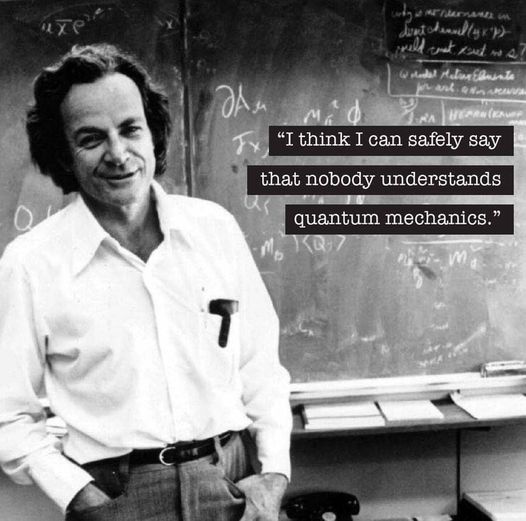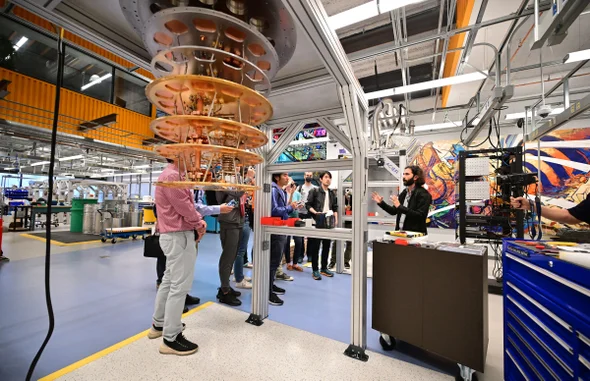The idea of quantum computing emerged years ago from the reflections of a bunch of scientists about what the fundamental limits of computing were. What they assumed was that if technology continued to comply with Moore’s Law, that is, if the number of transistors in a microprocessor doubled approximately every two years, then the decreasing size of the circuits within a silicon chip would eventually reach a point where individual elements would not exceed the size of a few atoms.
At that point, the physical laws that would govern the properties and behavior of circuits on a subatomic scale would no longer be classical but those of quantum mechanics. This gave rise to the possibility of creating a computer based on the principles of quantum physics. And thus, this gave rise to the possibility of creating a computer based on the principles of quantum physics.
Richard Feynman was one of the first to tackle this challenge in 1982 by creating an abstract model showing how a quantum system could be used to do calculations. The model explained how a machine could have the ability to perform quantum physics experiments inside a quantum mechanical computer.

Later, in 1985, it was David Deutsch who proposed the possibility that a quantum computer could be general purpose and published a theoretical paper that went on to show how a quantum computer could have capabilities far beyond those of a traditional classical computer. After Deutsch’s article, the race to develop practical applications for the quantum computer machine was kicked off.
What state are we in at the end of 2023 and what types of applications have we been able to develop that are beginning to deserve the attention of transformational leaders? Come and see.
Real-World Applications of Quantum Computing
As an emerging paradigm, quantum computing offers the potential to provide a significant computational advantage over conventional classical computing by exploiting the principles of quantum mechanics.
In recent years there has been relentless progress in both the development of quantum hardware and quantum algorithms that has brought the applications of quantum computing much closer to real-world needs.
The idea of quantum computing emerged years ago from the reflections of a bunch of scientists about what the fundamental limits of computing were
The world’s leading technology champions, such as IBM, Google, Microsoft and Intel, as well as some rather ambitious startups such as Rigetti Computing and IonQ, are racing to develop the first large-scale universal quantum computer that could solve many computationally complex and intractable problems, including problems in areas of data science, finance, drug design, etc.
Some of the applications of quantum computing that I dare say has the greatest potential today for businesses all over the world are those I review below.
Machine Learning Applications
Quantum computing promises to speed up machine learning algorithms to analyze classical data.
Although it has not yet been fully demonstrated whether quantum machine learning can provide superior computational efficiency compared to classical methods, the results obtained for example in quantum principal component analysis and quantum neural networks look promising.
Efficient searching and sorting of large datasets have become high priority for many transformational leaders, and quantum computing is beginning to offer real solutions.
Quantum computing promises to speed up machine learning algorithms to analyze classical data
Other popular machine learning applications, such as voice, image and handwriting recognition have become challenging tasks for traditional computers in terms of speed and accuracy. This is where quantum computing can be of great help by substantially improving pattern recognition and time lapses to solve these complex problems that would take traditional computers hundreds of years.

Robotics Applications
Robots use high graphics processing power (GPU) to solve computational tasks that are very data-intensive, such as vision, movement, and optimal control. Quantum computing may help perform calculations at considerable speed and improve the ability of robots to sense their environment and, by using cloud-based quantum computing, solve highly complex technical issues.
Furthermore, the main kinematic problems associated with the mechanical movement of robots can now begin to be solved through quantum neural networks that recognize the moments of friction and inertia of the robot’s joints.
Other typical issues of robot operation, such as identifying the reasons for the inconsistency between expected and observed behavior, can be solved using quantum algorithms.
Quantum computing may help perform calculations at considerable speed and improve the ability of robots to sense their environment
Quantum computing can also help reduce the complexity implicit in AI-based robotics by using quantum random walks to speed up response time and accuracy, rather than using information deduced from graph search.
Quantum Cloud Applications
A quantum cloud computer is a quantum computer that can be accessed over a network. Creating a safe and efficient environment for quantum computing in the cloud is an area that has great potential.
Top tech companies quantum initiatives like IBM Quantum, Google Cloud, Microsoft Azure Cloud, Amazon Web Services (AWS) Braket combine quantum computers with cloud computing that do not need to have a physical quantum computer installed. In this way, users have the opportunity to access quantum computers in the cloud to solve complex problems that require powerful computing.
As competition continues to intensify among the big tech players, quantum cloud computing services will continue to offer specifications that promise ever better performance and faster runtime.
Social Networks Applications
Social networks handle a huge volume of data every day as their use by millions of users continues to grow. Soon the amount of data in social networks will be so large that classic computing capabilities will no longer be able to process it easily and quickly in an acceptable time.
Processing social Big Data with relational databases where objects are semantically linked through multiple relationships is a major challenge. Mining relational databases often requires enormous computing power in terms of hardware and software to deliver reasonably accurate and timely results.

To manage all this data and extract value from it, it will be necessary to have a large computing capacity that is also fast and efficient.
Instead of the limitations presented by classical computing, quantum computing offers the ability to perform complex computation with social network data in an easy and efficient way, taking advantage, for example, of a graph theoretic representation of social network attributes to model sophisticated data structures and their interactions.
Quantum Simulators
Although our capacity to predict complex problems has increased over time, state-of-the-art predictions still need new capabilities, especially in the field of business and management applications.
Users have the opportunity to access quantum computers in the cloud to solve complex problems that require powerful computing
The possibility of addressing these developments has been limited to date by restrictions on access to disproportionately high computing power. Let us think that simulation models need to continually calculate and recalculate problems that are very complex, such as the calculation of customer flows, optimal mobility routes, prices, distribution, etc.
Until now simulations have used conventional computing tools and techniques, but with quantum computing it is possible to solve these problems more easily and in less time in a controlled environment using small-scale quantum simulators of 50 to 100 qubits.
Quantum Cryptography
Quantum cryptography is another application with great potential for real-life business. Quantum cryptography differs from traditional cryptographic systems in that the key element of its security model is based on the laws of quantum mechanics rather than classical mathematics. Since copying data encoded in a quantum state is not possible, the chances of being attacked by a cybercriminal are reduced.
Compared to traditional cryptography, quantum cryptography increases the probability of intrusion detection and improves performance. However, although with quantum computing companies can protect themselves better, it also adds the risk of being able to crack many of the conventional cryptographic systems used today (i.e., RSA).
Conclusions
Although advances in quantum computing look promising and the tech industry is moving closer to “quantum supremacy”—that is, the ability to solve a problem on a quantum computer that is intractable on a classical machine—many difficult challenges remain ahead that will probably take years to resolve.
Before any quantum computer can solve a complex business problem, the industry will need to find a way to develop a large-scale quantum computer and quantum hardware that is fault-tolerant and that keeps potential sources of error at acceptable levels. But this is still posing a real challenge for the entire technology industry.
Last but not least, although significant efforts are being made in this area, it is quite striking that quantum computing still does not have its own high-level programming language. This reflects the high level of technical difficulty associated with the development of quantum technological solutions.
It remains to be seen how long it will take the technology industry to overcome these barriers, which will surely give rise to a new world of possibilities that transformational leaders must remain very vigilant in the coming years so as not to miss out.
Photo by vecstock Freepik
